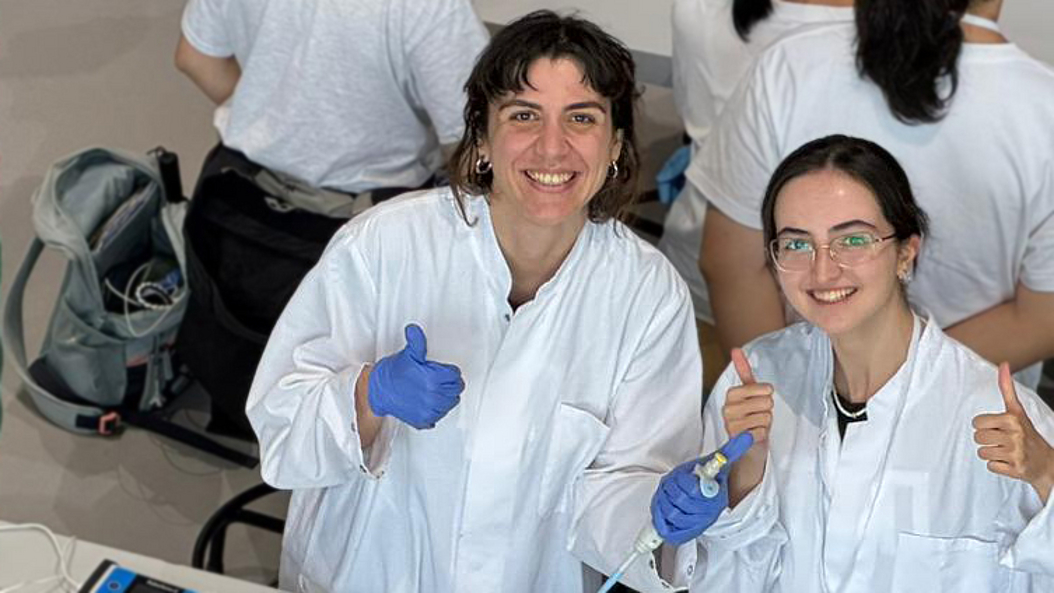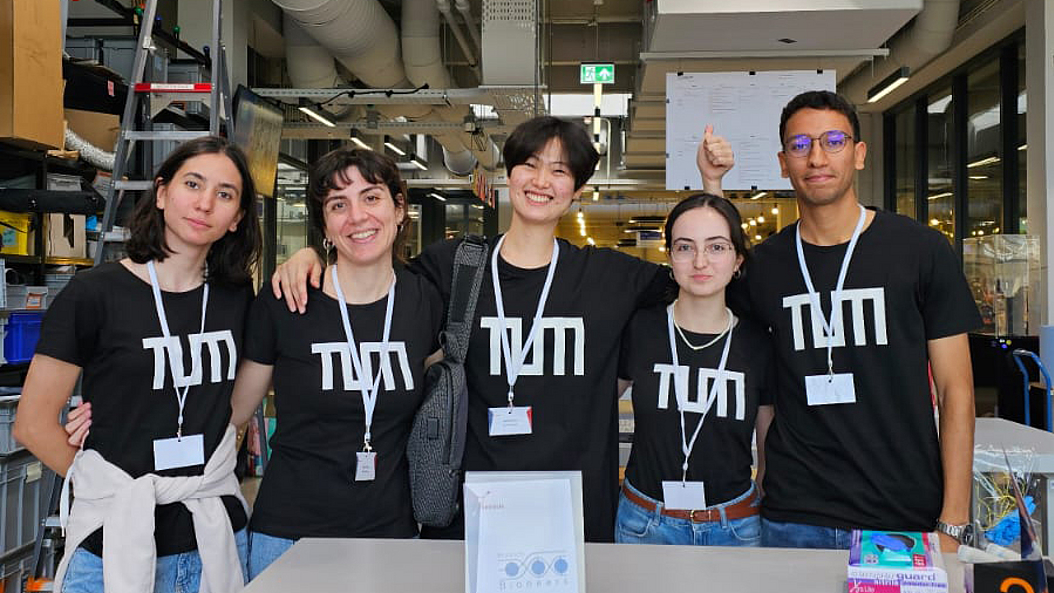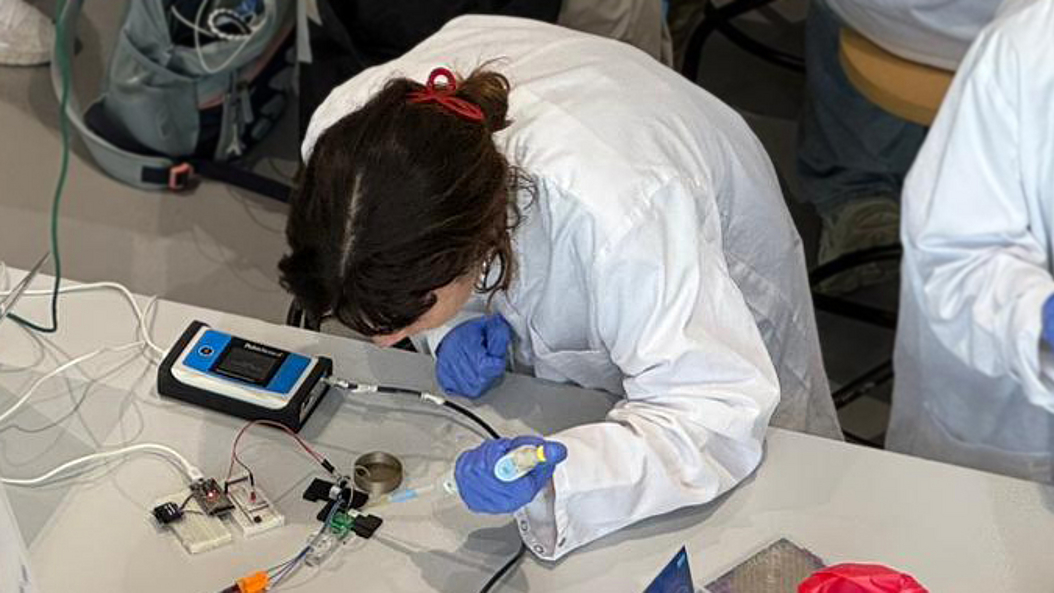Eighteen teams, four days, one challenge. From August 25 to 29, 2025, the TUM student team Munich Bioneers competed in the international student competition SensUs in Eindhoven. The goal: developing a biosensor capable of detecting acute kidney injury.
Since February, Tayis Arslan, Jaehee Choi and Eyed Fetni, together with seven other students, have been working on this year’s SensUs challenge. Over six months, each team worked on designing and building a biosensor to put to the test in Eindhoven. Each year, the competition spotlights a different disease. This year’s challenge: measuring creatinine, a biomarker of acute kidney injury – a condition in which one or both kidneys lose their ability to filter waste from the blood.

Image: Bernhard Gleich / TUM
What solution did you develop?
Tayis Arlan: In general, biosensors are designed to detect specific biomarkers and turn this into a measurable signal. For this, three main elements are needed: a biorecognition element that reacts with the biomarker, a transducer, and an element for signal analysis. Our biosensor had three enzymes crosslinked on an electrode. This three-enzyme cascade converts creatinine into hydrogen peroxide. The more creatinine, the more hydrogen peroxide and the higher the electrical current at the electrode surface, which we can measure.
Can you describe the competition experience?
Eyed Fetni: All teams receive the same samples and have two hours to measure them with their own sensor. The team with the best biosensor in terms of accuracy, speed and required sample volume wins. But the event is about much more than just competing. The organizers arranged workshops, company visits and social activities. The atmosphere was great – well organized, fun, and we met so many great people from all over the world. The campus was impressive, and Eindhoven as a city is beautiful.
What was the biggest challenge you faced in Eindhoven?
Tayis Arlan: Beside demonstrating the sensor’s performance, there are several other pitches during the competition. The Innovation Award pitch stood out as a significant challenge. It was our first time participating, and we had the opportunity to present in front of internationally renowned professors. Preparing for and delivering that pitch was an intense but very rewarding experience. We were able to answer most of the questions during the discussion and the atmosphere was very welcoming and supportive.
Who ended up winning the competition?
Tayis Arlan: Team MakeSense from ShanghaiTech University. They had a really nice design and I had a chance to talk with them about it. For us, as first-time participants, the most important goal was to learn as much as possible and enjoy the project. I think we definitely achieved that.
What were the biggest takeaways from the competition?
Tayis Arlan: The competition setting was certainly challenging, but I learned so much on both a technical and personal level. It’s a great opportunity as a student because a lot of the time you don’t know what you will face after you graduate. So it was really insightful to work in an interdisciplinary team with a lot of challenges, but also a lot of fun, to tackle an international competition and to gain insights into companies.
Why should other students think about getting involved next year?
Tayis Arlan: It’s a once in a lifetime experience. You learn an incredible amount, both academically and personally. And if you’re interested in entrepreneurship, you can focus on the translational side. Even before the competition, we had plenty of opportunities to connect with companies. For me, the project was also excellent preparation for my Master’s thesis. And it helps to build connections that can lead to bachelor’s or master’s theses, or student jobs.
Jaehee Choi: I’d especially recommend it if you want hands-on experience. For me, it was a great opportunity to put my academic knowledge into practice. We also learned a lot from each other. Most of us didn’t even know one another beforehand, as we study in different programs and are based in different buildings. The project really brought us together, and we’ve built many new friendships.

Image: Bernhard Gleich / TUM
Curious about the next challenge? Join the 2026 team!
Contact: munichbioneers@gmail.com
The 2026 topic: Parkinson’s disease and the continuous monitoring of levodopa.
More Information
- As a TUM Integrative Research Institute MIBE fosters interdisciplinary research and student projects. At MIBE, researchers specializing in medicine, the natural sciences, engineering, and computer science join forces to develop new methods for preventing, diagnosing or treating diseases.
- The students from the TUM team “Munich Bioneers” come from different degree programs and semesters and collaborated in three specialized sub-teams – Wet Lab, Electronics, and Software – to tackle the challenge. Beyond the main challenge of demonstrating the sensor’s performance – which is recognized with the Analytical Performance Award – the competition also includes three pitch sessions: the Translation Potential Award, the Public Inspiration Award and the Innovation Award.
- “Munich Bioneers” has been an official TUM student club since this year.
- Team members Munich Bioneers 2025:
- Tayis Arslan (Master’s Degree Program Biomedical Engineering and Medical Physics)
- Jaehee Choi, Eyed Fetni, Melisa Karatas, Jeongjoo Lim (Bachelor’s Degree Program Electrical Engineering and Information Technology)
- Helin Erbilir, Nihan Ozcan, Tuguldur Tumurbaatar (Master’s Degree Program Nutrition and Biomedicine)
- Elif Neva Yildirim (Bachelor’s Degree Program Molecular Biotechnoloy)
- Max Schultz (Bachelor’s Degree Program Biochemistry)
- SensUs is an annual international student competition for designing biosensors. It is organized by students from the Eindhoven University of Technology, the Netherlands. Since 2016, the competition highlights one disease biomarker each year, challenging teams to design a sensor within six months. More info: https://sensus.org/
- TUM team “Munich Bioneers” at SensUs
Contact Media Relations
MIBE Media Relations
presse@bioengineering.tum.de

